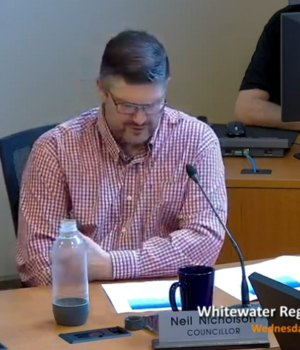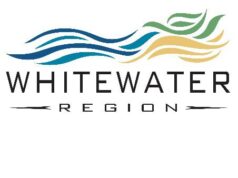Alexander Leach, Editor
Editor’s Note: I asked a few questions to Councillor Neil Nicholson, who is running for Mayor in the October 24th Election. Here are his responses.
Editor: What are your goals as mayor should you be elected?
Councillor Neil Nicholson: There are a number of issues facing Whitewater Region in the next four years. Some are ones that Council is directly responsible for and for others we need to be strong advocates for change. Affordability is front and centre. We need to keep taxes and fees as low as possible. This is not an easy task as the price of so many goods and services are increasing. To make these tough, but important, decisions we need to form a clear vision and long-term strategy for our region to know where we need to invest. There are also areas I believe we need to work to improve our services like our investment in our roads, highspeed internet, cell reception and youth and senior needs. Rural Ontario is not well served by the provincial hub and spoke method of distributing funds to larger centres who in turn offer services to rural neighbours. This often results in poor rural access to services. Health and safety services like childcare, primary care, home and community supports, ambulance must also consider rural needs and we need to ensure our voice is at that table. We must also consider our own plans for development, economic growth and tourism. I don’t believe we do enough here. The last four years have seen an explosion of residential and business development in Whitewater. We need to continue to engage with our business owners, our farmers and other operators to help enable continued expansion and retention of our key agricultural lands and businesses.
ED: What do you intend to do if you are not elected?
NN: If not elected, I will invest my time into youth sports and community volunteering. I believe very strongly in our community and will find other ways to contribute.
ED: How do you intend to address criticisms of Cobden’s water cost among residents?
NN: Water systems are expensive, especially when you take into account the underground distribution systems and the regulations in place to ensure safe drinking water. It is a challenge for rural communities to cover these costs, especially those on a fixed income or with low income. Although we made gains over the past four years we need to work harder to get provincial and federal investment to help with the capital costs of maintaining the system. This will help to reduce costs for every user. We also need to investigate if there are any cost relief progams that could be offered to those on fixed or low income. I will continue to fight to keep these costs as low as possible and to get provincial and federal funding to assist us.
ED: As founder of the Whitewater Seniors Task Force, do you have a further plan retaining the younger generations of Whitewater Region?
NN: Youth are the future of our community and are just as important as the seniors and older adults who shaped our community into what it is today. We have incredible community organizations – rec associations, minor hockey, church groups, BORCA, 4H just to name a few – and they invest heavily in our youth and programs for them. I want to cultivate a closer relationship with these organizations and our township staff and to invest in opportunities that further enable these volunteer organizations to flourish and in turn, support our youth. I want to also develop a closer relationship with the Community Resource Centre from Killaloe to ensure their programs like Game On!, the Toy Bus, summer camps and other programs will continue in Whitewater Region. At the same time I want to continue to make our community a place where young families want to come back to in order to raise a family. What attracted my family here is the rural way of life, close knit communities, access to outdoor recreation, small local schools and a low cost of living. We must hold onto these aspects of our community as we encourage growth and development in order to attract young families.
ED: What is your plan next for the seniors’ population in Whitewater?
NN: Something I have learned with working closely with our senior population is that they don’t need or want municipal leaders to tell them what they need or their plan for them. They know what they need, we need to listen and work with them to define their needs and then find ways to fill in the gaps. My plan is to continue the work that our Task Force started and to continue to advocate with all higher levels of government to ensure they contribute to rural seniors needs. We will continue our partnerships with Renfrew Seniors, Eganville Seniors and Carefor to extend their services like Meals on Wheels, volunteer transportation, and other programming.
ED: How do you plan to address the concerns about the rinks and other facilities around Whitewater needing repairs.
NN: It’s incredible when you consider that our recreation facilities were all primarily built with volunteer labour and significant community fundraising. But these facilities are aging and need repair, in some cases we are expecting significant repairs will be needed. This is where council will have to really work hard to come up with short-term plans to keep access to these facilities in each community through smart investment. We also need to be prepared to pivot. As the demand for ice rentals decreases we need to consider using our facilities to offer different types of recreation to the community. Council must generate a long-term plan for a new recreation complex and take the steps now to ensure our future generation has a modern facility to support recreation.
ED: What is your plan for development in the Whitewater Region, as a number of development projects and tourism projects are in development and subject to controversy.
NN: I believe that Whitewater Region has untapped potential in terms of development and tourism. There has been two plans of subdivision come to council this term, we have processed 100 severances since receiving delegated authority from County 18 months ago (compared to 25/year prior to delegated authority), and well over 300 building permits have been issued just this past year; it is clear that Whitewater Region has attracted growth and development. Yet, I believe there is more that we can do. Many residents have suggested we examine having our own Official Plan and we need to see how this might further empower our township. Tourism and business retention/expansion is also an area we need to be much more active in supporting. As I mentioned earlier, we need to engage with business owners, entrepreneurs, farmers and developers to create a joint way forward.
What is your plan in regards to the region’s autonomy and relationship with the County of Renfrew? How do you plan to take the relationship between them?
The County of Renfrew is the largest in Ontario and comprises 17 different municipalities. Together we are a strong voice for rural Ontario, especially when in competition with huge city centres for provincial and federal support. You might not know, but 30% of the property tax dollars that we collect are paid to Renfrew County and are meant to pay for the County roads in our township, ambulance, and many other county services. Whitewater Region must maintain active participation with the County to ensure that our township needs are heard and met; elected officials are responsible to our residents that we are getting value for our money and therefore it will be necessary to work closely with County Council and staff. I do not see it as a higher versus a lower tier relationship, just a splitting of responsibilities. As many have highlighted before, townships are the closest level of government to the people, we are the most capable of hearing and communicating the needs and wants of our people. We are not, nor would we accept a sub-servant role to the County. If elected, I will look forward to building close collaborate relationships with other County Councillors and staff as I seek ways to make life better for all County residents while being the voice of Whitewater Region.
The County of Renfrew isn’t the only government organization that we send a significant portion of the tax dollars we collect. 19% is sent to the School Boards and 10% is paid to the Ontario Provincial Police (OPP). While our School Board Trustees help to steward our contributions to the local school boards, I believe we need to have closer relationships between our township and our school boards, especially those with schools in our township. Without schools we would become a bedroom community and therefore we need to find ways to support our schools and ensure they remain viable and in our communities. The same approach needs to be applied to our relationship with the OPP. We need to build close working relationship with our Detachment Commanders to ensure the community safety and well-being of all residents, not only those in urban areas or allong major routes. We are responsible to ensure the funds we provide OPP are effectively servicing our community.






![Kenopic/Smith Auction [Paid Ad]](https://whitewaternews.ca/wp-content/uploads/2018/10/advertising-100x75.jpeg)

